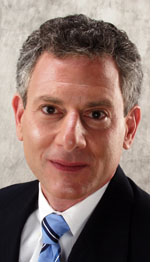| |
|

NOW-SUNDAY, SEPTEMBER 7

FRIDAY, SEPTEMBER 12, 2008 Temple Solel S'more Shabbat
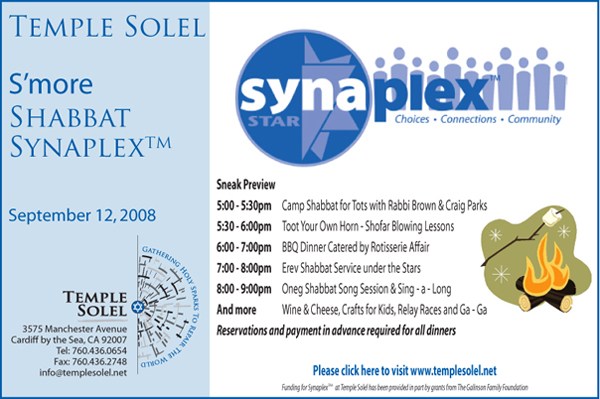
________________________________________________________
MON., SEPT. 29-THURS., OCT. 9



Emergency campaign to rescue the Jews of Georgia
Chief Executive Officer, United Jewish Federation of San Diego County

THE VIEW FROM JINSA
Europe, dependent on Russian oil, unwilling to intervene in Georgia war
By Shoshana Bryen
 WASHINGTON, D.C.—Expelling Russia from the G-8 and suspending new partnership talks between the EU and Russia, along with support for Georgia in whatever political settlement is fashioned after the shooting stops were our first thoughts, and our second. President Bush called on Russia to "reverse the course that it appears to be on as a first step toward resolving this conflict." WASHINGTON, D.C.—Expelling Russia from the G-8 and suspending new partnership talks between the EU and Russia, along with support for Georgia in whatever political settlement is fashioned after the shooting stops were our first thoughts, and our second. President Bush called on Russia to "reverse the course that it appears to be on as a first step toward resolving this conflict."
What? No military option?
Viscerally satisfying as it would be to suggest sending in the Marines and Special Forces to help the Georgians in their quest to expel the Russians, it isn't a viable option. Even having the US Air Force fly a "no-go zone" above Georgia is unrealistic.
The United States - for all that we are called "cowboys" and denounced for "going it alone" - cannot and does not operate abroad without support from countries in the region. Saudi Arabia was our staging ground for the expulsion of Iraqi forces from Kuwait. Kuwait is our staging ground for operations in Iraq now. CENTCOM operates out of Qatar. Uzbekistan, Kazakhstan and Turkey are essential partners in the region.
In Europe, of course, we have NATO. And NATO was, in fact, designed to counter Soviet aggression - Russian aggression is its successor. Except that Georgia is not a NATO country and it isn't at all clear that the Europeans can or want to be party to a war with Russia. Russia currently controls 25% of the oil imported by European countries and an even higher percentage of imported natural gas. It is August now, but it will be December soon. Russia's ability to cut off supplies changes the equation for them as a Saudi cutoff would for us.
It is ironic that with the primary countries of Europe governed by basically pro-American and fairly conservative leaders - Italy, France, Germany and Britain - the mortgaging of Europe's energy policy to Russia has made the Atlantic alliance impotent in the face of Russian subversion of Georgia. Aside from the obvious tragedy for Georgia and the growing threat to Ukraine, the revelation of the political implications of European dependence on Russia bodes ill for other areas struggling to democratize under threat. Even the Baltic States must be shuddering as Russia widens its sphere of influence.
It is also a serious impediment to America's ability to protect and defend friends abroad.
We have gone more than the extra mile and paid in blood to build an Iraq that can stand as a stable, modern and moderate Arab country in the very heart of the Arab world. Jordan's King Abdullah visited Baghdad yesterday for meetings with Prime Minister al Maliki. He announced the return of a Jordanian Ambassador to Baghdad and called on other Arab states to reinstate full relations with Iraq. Bravo.
But just as we prove we can stay the course and watch the tide turn in our favor in Iraq, the Georgian debacle is a reminder of our limitations if our friends can't or won't defend their own region.

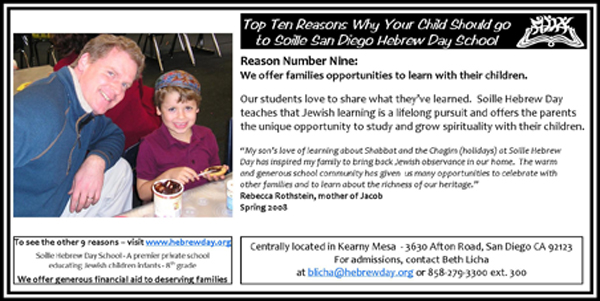
l




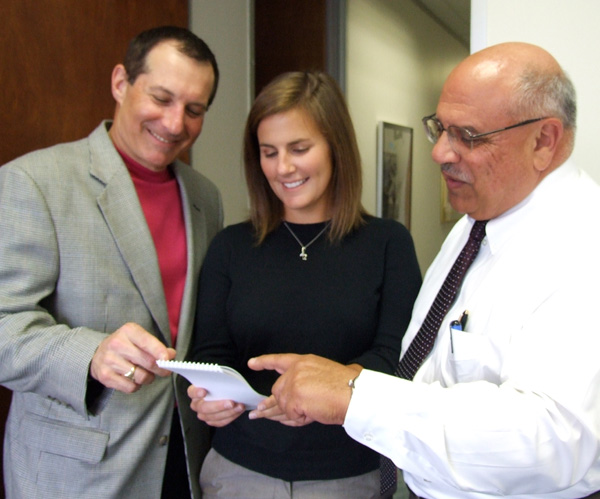
2008 JCC MACCABI GAMES
This security chief did so well, you haven't heard of him or his team
By Donald H. Harrison
SAN DIEGO—If you haven’t heard or read Phil Ginsburg’s name up to now in association with the recently held JCC Maccabi Games, it is because he and his volunteers did a wonderful job keeping safe every one of the venues at which some 1,600 Jewish athletes, aged 12 to 16, competed in a variety of sports.
Had there been any untoward incidents—any attack against the young Jews or the institutions where they competed—everyone would have become familiar with his name via media outlets. Ginsburg served as the volunteer security chairman of the JCC Maccabi Games, on special loan from the Anti-Defamation League.
Ginsburg is an attorney who has become a specialist as a volunteer in providing security for Jewish institutions since shortly after the 9/11 terrorist attacks. At that point, as a member of Congregation Beth Israel, he and other congregants were recruited by the then-executive director Stuart Simmons to watch the parking lots and doors of Beth Israel and to report any suspicious activity.
He went on to become a member, and later chairman, of the Inter-Agency Security Committee of the Anti-Defamation League, under the tutelage of the Anti-Defamation League’s regional director in San Diego, Morris Casuto. This volunteer position involved visiting synagogues, Jewish agencies and centers and assessing with their leadership the potential security risks to their institutions. Was there a door that was constantly being opened and unwatched? Could people get into the building without anyone noticing them? Are there cameras to record suspicious or malicious activity during the nighttime hours? Ginsburg would take note of the potential security soft spots and make recommendations for hardening them.
Ginsburg was benefitted by having as his vice chairman Ted Parker, a retired employee of the Rand Corporation, who now volunteers for the police department in providing security advice to public and private institutions that request assistance. The security mavens decided last year that they needed to have at least one member of their team serving as a coordinator at each venue of the games, someone who would take responsibility for organizing and training the volunteer security force to the specific needs of each place.
Besides the Lawrence Family JCC, Jacobs Family Campus, which was the main headquarters for the games, there were also sports conducted in these places: La Jolla Country Day School, Nobel Recreation Area; three separate areas at UCSD: Warner Field, the baseball diamond and RIMAC, where basketball was played. In the Carmel Valley area, meanwhile, games were played at San Diego Jewish Academy, Cathedral Catholic High School, and Canyon Crest Academy. There was bowling competition at Mira Mesa Bowl, and three different days of golf, each at a separate golf course, including on the last day, Torrey Pines, where the U.S. Open had been played earlier in the year.
And, that was not all. The 70-member volunteer security force had supporting roles to play in three special evening events: the opening ceremonies at Cox Arena, a night at Sea World and a night aboard the aircraft carrier museum, the USS Midway.
In most places, not one, but two, venue security chiefs were appointed to work in concert not only with the volunteers but also with the San Diego Police and UCSD Police departments, and with Omni Security, which provided professional security guards.
At the JCC, Dr. Bill Friedel and Louis Vener shared the responsibilities; at La Jolla Country Day, it was Dr. Nate Harrison and Jerry Gordon, and at the Nobel Recreation Area, it was Heather Frank, ADL’s assistant director. On the UCSD campus, Alan Gorinstein took Warner Field, Gerry Wellman had the baseball diamond and Jerry Sampson and Greg Garver shared responsibilities at the RIMAC.
In Carmel Valley venues, Ginsburg’s team included Dr. Alan Spector and Cathi Marx at the San Diego Jewish Academy; Dr. Jerry Spector and Greg Zweibel at Cathedral Catholic University; and Howard Dworkin and Jerry Niemark at Canyon Crest Academy. Paul Krupsaw traveled with the golfers from course to course over three days of competition, and Stuart Simmons—the man who had gotten Ginsburg interested in security in the first place—became his volunteer at the bowling alley.
Additionally roving services among the various venues were provided by Simma Nemeth and Linda Diderman.
The security chiefs stayed in touch with Ginsburg and Parker and with their own teams at the venue by walkie talkies. The two-way radios were also provided to the security guards from Omni as well as to the police teams, for whose services the Police Departments’ special events department was reimbursed by the JCC Maccabi Games.
Occasionally, at the Lawrence Family JCC—which sits right next to the Northern Division headquarters of the San Diego Police Department—other officers would come on their own time, among them Captain Shelley Zimmerman, a member of the Jewish community, who commented that she wished she had a chance to compete in the Maccabi games (started in 1973) when she was a youngster.
Ginsburg said all the security forces had a basic plan, which became known by the acronym DORR, for “deter, observe, report, and respond.” The physical presence of security guards and police were the most obvious means of deterrence; the fact that they were obviously paying attention to their surroundings another. “Observe” meant just that: were there people approaching the venue who seemed out of place? Who didn't have proper credentials? Whose behavior was suspicious? “Report” involved communicating anything out of the ordinary by walkie talkie. As for “respond,” said Ginsburg, “that doesn’t mean tackling the intruder. It means responding in an appropriate way to take as many people out of harm’s way as possible.” If the intruder had a gun, responding might mean screaming “get down!” or yelling “there’s a gun man.”
“We thought about many scenarios,” Ginsburg said, ranging from the lone wolf terrorist to dealing with bomb scares or actual bomb plots.
With 70 people participating in venue security, some working multiple five-hour shifts over the JCC Maccabi Games, the security aspects of the competition went off without a hitch.
Were there any incidents at all? I asked Ginsburg.
There was one, in which a man without credentials raised suspicion at the JCC. Ginsburg as well as the JCC’s top lay leadership of President David Wax and Executive Director Michael Cohen and Associate Executive Director Nate Stein had told the coaches that although there was a separate security team, security was everyone’s business. Craig Schloss reported that the man without credentials had said he was there to service the JCC’s fire extinguishers, but that he had disappeared. With Schloss’s help, security cameras scanned the JCC parking lots and found the man, who was identified as indeed being the man who regularly comes to service the fire suppressant system.
Ginsburg said the police were impressed, not only that there was such quick action to identify a possible intruder but that there were people on premises who knew how to operate the security camera system for optimal effect.
Heather Frank, who was venue security chief at the Nobel Recreation Area, where soccer was played, said with other volunteers, two police officers on premises and two-hired security guards, there never was a problem, except for an occasional athlete who had to be sent back to the JCC to fetch forgotten credentials.
“I got to watch a lot of soccer,” Frank said.
“So many people gave up so much of their time to make sure that the games went on effectively and in safety!” Casuto said.
Now the assignment of Ginsburg to the JCC Maccabi Games has been completed and he plans to continue in his duties as a consultant to Jewish institutions. He said he hopes that the 70 volunteers will bring security concerns and ideas back to their home agencies and synagogues, and that security will be an ongoing part of the planning process for any Jewish event or physical structure.

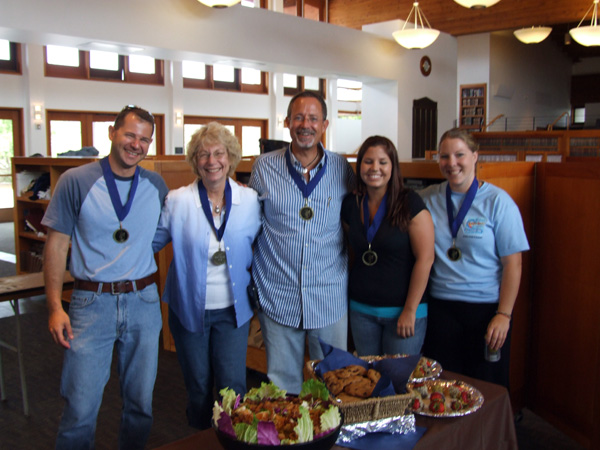
.
THE JEWISH CITIZEN
Preparing lunch, fostering teamwork
By Donald H. Harrison
 LA JOLLA, California--Last year, the United Jewish Federation’s staff built sandcastles. Yesterday, at the staff retreat, they built Chinese chicken salads, chocolate chip cookies and chocolate strawberries. What did they get for their efforts? LA JOLLA, California--Last year, the United Jewish Federation’s staff built sandcastles. Yesterday, at the staff retreat, they built Chinese chicken salads, chocolate chip cookies and chocolate strawberries. What did they get for their efforts?
Well, first of all lunch.
But besides that, said CEO Michael Rassler, the purpose was “to develop a sense of teamwork and camaraderie, to recognize that everybody has a wide variety of strengths, often in areas that we know nothing about, and to learn to work together to utilize those strengths and to allow ourselves to do the best job we can.”
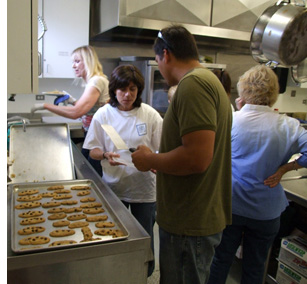 The retreat was held at Congregation Adat Yeshurun under the supervision of member and professional caterer Felicia Gipsman, proprietor of Catering by Felicia G. Six teams of five or six members each were formed, and were told that on a central table in the Orthodox synagogue’s kosher kitchen had been placed sufficient ingredients for all three dishes. Scenes such as this at the right soon ensued. The retreat was held at Congregation Adat Yeshurun under the supervision of member and professional caterer Felicia Gipsman, proprietor of Catering by Felicia G. Six teams of five or six members each were formed, and were told that on a central table in the Orthodox synagogue’s kosher kitchen had been placed sufficient ingredients for all three dishes. Scenes such as this at the right soon ensued.
Each team had to decide how many of each ingredient they needed and then to divide up responsibilities in preparing lunch. Gipsman would be the main judge of their efforts. “I have a very discriminating palate,” she told me. “I can taste whether white pepper or black pepper was used in a salad dressing; I can really taste the different elements.”
The other judge was someone you might call “everyman,” a person who generally eats anything put in front of him without complaining, the kind of person who thinks there is no better dessert than a good conversation. That would be me.
We decided to judge the winning team based upon the highest cumulative score. They would get two points for the presentation of their food; one point for the salad; one point for its dressing; one point for the cookies, and one point for the strawberries dipped in chocolate and sprinkled with nuts or other toppings. So, a perfect performance would have been a score of 6.
One of my favorite Chinese salad presentations had stalks of vegetables coming together to form a nest for a piece of yellow carrot that had been carved into a six-pointed star. I realized immediately the perfect ambiguity of this symbol: on the one hand it might be the Star of David, nearly universally recognized as a symbol of Judaism. Or, given that this was a Chinese salad, it was possible that the team had carved the form of the game board for Chinese checkers!
In many cases, the “acid” test—and I use this term advisedly—was the salad dressing. Gipsman made a point of personally tasting each dressing, and, in one case, as her face wrinkled in alarm, and she ran for a cleansing glass of water, I knew that the dressing had too much vinegar. Right at that point, I decided to delegate to my fellow judge all the salad dressing issues. It was clear her taste buds indeed were highly developed.
Perhaps in appreciation for this—or perhaps figuring by my waist line that I would enjoy such an assignment—Gipsman broke off some chocolate chip cookies and asked for my consumer’s opinion. Well, gosh, I liked them all. But I remember I thought that one was perhaps more gooey than the others, so we graded down for that.
When all was said and done, one team had emerged with a score of 5.5 as the clear winner in a close contest: The team consisted of Eyal Dagan (Israel Center); Nadine Finkel (Planning & Allocations); Jessica Harvey (Women’s Division); Dana Levin (Campaign), and Michael Rassler (CEO.)

As the UJF staff members ate the "fruits of their labor" in the courtyard of Congregation Adat Yeshurun, I asked Levin how the winning team had organized itself.
She responded that Rassler had volunteered to do all the chopping. I commented that was kind of scary when you realize that Rassler is the head of the organization. Could this be the skill that he wanted to hone for the coming UJF year? But he also made the dressing, Levin pointed out. I happened to know that was one of the dressings that had pleased the Gipsman palate because of its light touch.
Dagan, whom she referred to as the “Israel strawberry master,” took responsibility for that part of the competition, and in truth his sculpted dipped creations were quite appetizing. It could be he had an advantage, given his previous service in the Nahal, an Israeli Army unit that fills in the times between active duty by serving on kibbutzim. His unit worked at Kibbutz Jezreel in the Jezreel Valley near Mount Gilboa. It’s an area known for its agriculture.
Finkel and Harvey worked together on the chocolate chip cookies, for which they had a pretty good idea of what measurements might be needed.
As for Levin, herself, cooking is one of her hobbies. Not only does she do it at home, but she attends cooking classes. So she volunteered to handle all the salad ingredients that required some stove time: the almonds, the won tons and the chicken.
So what skills from this cooking exercise did Levin believe will be useful at Federation?
“Delegation, compatibility, communication,” she answered.
“The teams started from scratch, and the first thing that needed to be done was to evaluate the people given the particular task or the project,” said Rassler. “You take that to the office, and you have a lot of staff coming together at whatever level they are at, and when they are working on a new or different task, or something we have done for years, maybe they will find that there is a new way to look at it—a different way to consider how to address an issue.”
These were the lineups for the other teams: 1) Brooke Bremley, Carly Feuerstein, Alyssa Goldberg, Debbie Kempinski and Brenda Sanders. 2) Carole Brewer; Bob Calmanson; Daphne Lavi; Arielle Morrison, Barbara Sherman and Leslie Weening; 3) Tina Friedman, Lisa Haney, Temekia Leverton, Miriam Norton, Patty White and Lance Yeaman; 4) Raquel Benguiat, Jane Fantel, Nancy Feldman, Rachel Kitt and Liz Wolfson, and 5) Diane Beckel, Crystal Cruz, Phyllis Freeman, Eddie Levy, and Michael Sonduck.
So, I asked Levin, which was more fun? Building sandcastles or lunches?
Lunches, she replied unhesitatingly.
She didn’t have to explain why. You can’t eat a sandcastle.

.jpg)

Thursdays with the Songs of Hal Wingard
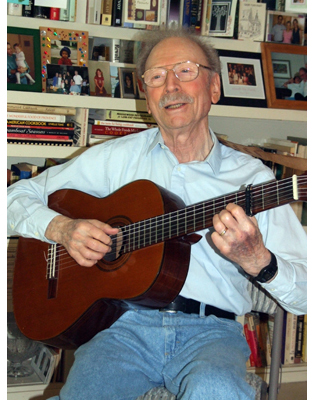 Editor's Note: We continue our presentation of the songs of Hal Wingard, moving this week to the songs he wrote on some perennial issues: loving, the lessons of life, and dying. Here is a link to an index of Wingard's songs published by San Diego Jewish World. To hear Hal performing the song, click on its title. Editor's Note: We continue our presentation of the songs of Hal Wingard, moving this week to the songs he wrote on some perennial issues: loving, the lessons of life, and dying. Here is a link to an index of Wingard's songs published by San Diego Jewish World. To hear Hal performing the song, click on its title.
#28, Wondering
Wond'ring as my plane takes flight,
Wond'ring if in time I might,
Wond'ring if in time I might
Meet you across the aisle
Hoping you will turn your glance
Wond'ring if you'll find the chance,
Wond'ring if you'll find the chance
To look at me and smile.
Wanting you to smile at me,
Wond'ring if your eyes will see,
Wond'ring if your eyes will see
The love I feel for you.
Wishing you were close to me,
Wond'ring now if you will be,
Wond'ring now if you will be
The one who loves me, too.
Wond'ring how our love will grow,
Hoping that somehow you'll know,
Hoping that somehow you'll know
And show you understand.
Wanting now to move to you,
Wond'ring what our love will do,
Wond'ring what our love will do
Before the plane will land.
Wand'ring from the baggage claim,
Wond'ring if you feel the same,
Wond'ring if you feel the same
As I, with heart so blue.
Wond'ring now where you have gone,
Wond'ring how I'll travel on,
Wond'ring how I'll travel on
Without a love like you.
Without a love like you.
#304, Last Will and Testament
Were I to make this song my last,
What might I want to say
To summarize the wisdom learned
As I have tread life's way--
What sage advice in simple words
Will give you inspiration,
Provide you strength to overcome
Life's trials and tribulation?
I could advise that you choose love
To govern all you do,
That you support devoted friends
While to yourself you're true.
I could advise that you eat well,
But eat in moderation,
And daily jog at least until
You drip with perspiration.
But none of these alone can be
The thrust of my advice.
So let me clarify these thoughts
By being more precise.
Of all the factors you should heed
There's only one that's prime:
Each day be sure to dress yourself
Just one shoe at a time.
Were I to make this song my last,
That's what I'd want to say
To summarize the wisdom learned
As I have tread life's way.
#286, Dying
I wonder what it’s like to die.
I’d really like to know.
I’d even make a dying try
Before my time to go
Before my time to go
The only problem I can see
Is how most dying ends,
For once you’re dead there may not be
Much contact with your friends.
Contact with your friends.
And yet, I’d take a try at dying
For knowledge I’d derive,
If I were sure that after trying
I still would be alive.
I still would be alive.
Alive.


ADVENTURES IN SAN DIEGO JEWISH HISTORY
Editor's Note: To create a permanent and accessible archive, we are reprinting news articles that appeared in back issues of various San Diego Jewish newspapers. You may access an index of the headlines of those articles by clicking here. You may also use the Google search program on our home page or on the headline index page to search for keywords or names.
Fund Requests Pledge Payments
From Southwestern Jewish Press, November 14, 1949, page 8
The officers and directors of the United Jewish Fund are pleading with members to make good their pledges now so that cash will be available to forward to the United Jewish Appeal in an emergency crisis.
In answer to the appeal that had come from Israel, the United Jewish Fund has already forwarded $117,750 in cash to the United Jewish Appeal so that immigration can continue from Europe to Israel, said Max Rabinowitz, Treasurer of the Fund.
In order to meet this emergency, the extraordinary action has been taken of borrowing money from banks and organizations. More cash is needed now, so that the total allocation which will be agreed upon by the Allocations Committee can be forwarded immediately to the national office of the Appeal.
The Allocations Committee under the Chairmanship of Mrs. Gabriel Berg, has been meeting in order to decide the distribution of the Funds which have been collected in the San Diego community. The Committee has already decided that the largest possible amount shall be sent to the United Jewish Appeal of 1949. Members of the Committee met at a Brunch in the Franciscan Room of the El Cortez Hotel on Sunday, October 23rd, to make the final recommendations for allocations to the United Jewish Fund Board of Directors. Committee members are Mrs. Gabriel Berg, Chairman; Mr. Nate Ratner, Max Rabinowitz, Sol Price, Carl Esenoff, Nate Schiller, Richard Levi, Victor Schulman, Louis Steinman, Louis Moorsteen, Saul Chenkin, M.S. Berlin, M.D. Goodrich, M.S. Fisher, Ben Harris … Sam Rassin, Maurice Harris, Al Newman, MRs. Saul Chenkin and Yale Naliboff.
Jewish Institute Opens for Registration
From Southwestern Jewish Press, November 14, 1949, page 8
With one-hundred and sixty adults registered for the Institute of Jewish Studies, the second year of this joint project of the three Synagogues and he United Jewish Fund indicates that it will be more successful than last year’s Institute, according to Dr. A.P. Nasatir, Dean.
At the Registration Rally, which was addressed by Dr. Dinnen, Executive Director of the Board of Jewish Education of Los Angeles, 175 people were in attendance. Dr. Dinnen spoke of the need of Jewish education and culture in the life of the American Jew.
Classes formally opened on October 12, with all courses well attended. Courses are being offered in Beginning and Advanced Hebrew, Modern Jewish History, American Jewish History, What’s Cooking in Judaism, Contemporary Israel, Biblical Literature, Jewish Marriage and family Life, Comparative Religion and Great Jewish Books.
Members of the faculty who have given their time without pay are: Rabbi Baruch sTern, rAbbi Morton Cohn, Rabbi Monroe Levens, Dove Abramis, Dr. A. P. Nasatir and Dr. Harry Ruja of State College, Albert A. Hutler of the United Jewish Fund; Irwin J. Wohl of the Community center is acting as Registrar; I.L Domnitz, Mrs. Al Neumann, Mrs. Harris Rubel, and Mrs. Nasatir who has the Great Books course.
Registration is still open in several courses.
JDC Western States Conference Ends
From Southwestern Jewish Press, November 18, 1949, page 1
LOS ANGELES, November 13—Responsibility of the American Jewish community to the displaced Jews of Europe and to those emigrating to the United States was bluntly stated here this week-end when Jewish community leaders met for a joint western regional conference of the Untied Service for New Americans and the Joint Distribution Committee.
Joseph E. Beck, executive director of United Service for New Americans, called upon the “American Jewish community of some 4 ½ to 5 million people to provide homes, temporary economic support, life and cultural activities for 60,000 fellow Jews.”
In the two days of concentrated workshops and open forums, the delegates from nearly two hundred communities discussed problems of integrating Displaced Persons and the necessity of continued support of world-wide relief operations. They also elected new regional representatives of Joint Distribution Committee and the United Service for New Americans.
Among them were Morrie Douglas and Eli H. Levenson, reelected to the Executive Committee of the Western States Region of the J.D.C. and Saul Chenkin, named this year for the first time.
Judge Bernon also disclosed that some 300,000 Jews remain in France, 350,000 in Rumania, 180,000 in Hungary. “There are only 20,000 of Germany’s pre-war 600,000 Jews remaining in that unhappy country,” he said, “and ninety thousand left of the 3,300,000 who constituted Poland’s pre-war Jewish population.”
Joint Distribution Committee has moved practically all Jews out of Bulgaria and Yugoslavia, he said.
Judge Bernon said that most of Eastern Europe’s Jews want to emigrate and Joint Distribution Committee is attempting to remain wherever its operations are not curtailed by the {governments}.
Evelyn Harris, volunteer case worker for the United Jewish Fund’s program for refugees in San Diego, presented a paper at the Conference, which was received with great interest.
Local Leaders To Be Honored At Annual United Jewish Fund Meeting
From Southwestern Jewish Press, November 18, 1949, page 1
Eli H. Levenson, President of the United Jewish Fund, will be honored by the Jewish Community of San Diego on Sunday, November 28, in the Marine Room of the San Diego Hotel, at the 16th annual meeting of the United Jewish Fund.
Three years of service as President of the United Jewish Fund, as an executive Board member of the district B’nai B’rith, and as an active participant in civic affairs, he will be rewarded as his fellow citizens gather to pay homage to this young lawyer.
Tribute will also be paid to an older lawyer, Judge Jacob Weinberger, on his return as the Resident Judge in San Diego. Judge Weinberger was the first President of the Fund and did much to bring it into existence.
Saul Chenkin and Louis Steinman, co-chairmen of the 1949 campaign, and other outstanding members of the San Diego community, will be honored for their leadership in the 1949 Campaign. Along with them outstanding community leaders will be announced by the “Key Club”, which will induct new members who receive the “Key Men’s Award” for service to the community.
The disbursement of funds raised in the 1949 Campaign will be announced, and a report received from the Nominating Committee. Election of members to the Board of Directors will be one of the highlights of the annual meeting. Nominees are: Dr. A.P. Nasatir, for a one year term; for a two year term, Mrs. Gabriel Berg, M.S. Berlin, Edward Bland, Saul Chenkin, I.L. Domnitz, Morris Douglas, Maurice Harris, Rodin Horrow, Morris Niederman, Abe Ratner, Mitlon Roberts, Abe Schiller, Al Neumann, Dr. R.M. Stone, Sam Sosna, Abe Sackheim and Harry Snyder.
Members of the Board of Directors whose terms do not expire are Judge Jacob Weinberger, Nathan F. Baranov, Edward Breitbard, Morris Feldman, M.D. Goodrich, Leo Greenbaum, Ben Harris, Eli H. Levenson, Louis Moorsteen, Mrs. Al Neumann, Dr. Walter Ornstein, Sol Price, Max Rabinowitz, Nate Ratner, Victor Schulman, William Schwartz, Louis Steinman, Henry Weinberger and Frank Winicki.
Reservations for the annual meeting may be made by calling F-0171, according to Morris Douglas, Chairman of the Arrangements Committee.
{Return to top}


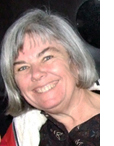 Nancy Harrison Nancy Harrison
cruise & tour specialist
(619) 265-0808

|
|
